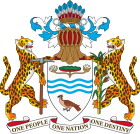| |||||||||||||||||||||||||||||||||||||||||
53 seats in the National Assembly 27 seats needed for a majority | |||||||||||||||||||||||||||||||||||||||||
|---|---|---|---|---|---|---|---|---|---|---|---|---|---|---|---|---|---|---|---|---|---|---|---|---|---|---|---|---|---|---|---|---|---|---|---|---|---|---|---|---|---|
| Registered | 369,088 | ||||||||||||||||||||||||||||||||||||||||
| Turnout | 85.14% | ||||||||||||||||||||||||||||||||||||||||
| |||||||||||||||||||||||||||||||||||||||||
| |||||||||||||||||||||||||||||||||||||||||
 |
|---|
| Constitution |
General elections were held in Guyana on 16 December 1968. [1] The result was a victory for the People's National Congress, which won 30 of the 53 seats, although the PNC's victory was the result of fraud as the government had direct control of the elections. [2] Voter turnout was 85.1%. [1]


